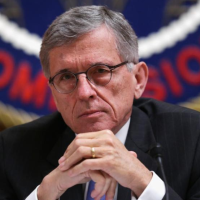FCC Advances Plan that Threatens Net Neutrality
 FCC Chairman Tom Wheeler (photo: Alex Wong, Getty Images)
FCC Chairman Tom Wheeler (photo: Alex Wong, Getty Images)
A new set of rules governing access to the Internet has sparked complaints and concerns from both sides of the debate over net neutrality, the belief that all content flowing on the internet is treated equally.
The Federal Communications Commission (FCC) unveiled its proposed regulations on Thursday, claiming they would preserve net neutrality.
FCC Chairman Tom Wheeler acknowledged in his remarks that “the potential for there to be some kind of a fast lane available to only a few has many people concerned.” But Wheeler, a Democratic appointee of President Barack Obama, said he rejects the concept of the Internet being “divided into haves and have nots, and I will work to see that that does not happen.”
But Wheeler’s assurances were not enough to assuage net-neutrality advocates who say the rules as drafted leave open the door for companies such as AT&T and Verizon to charge behemoths like Netflix or Facebook so their content streams faster.
“The chairman spoke very eloquently about why the open Internet matters, but these are not rules that would accomplish this,” Free Press CEO Craig Aaron told Politico. “There is a disconnect between what is said in his statement and what the effect would be.”
Aaron’s and others’ worries stem from draft language that bars Internet providers from knowingly slowing data, but allows those companies to provide a fast lane of service to corporations that can afford the cost.
Key Democrats in Congress also expressed concern about the FCC rules, which will be subject to public comment until July 15.
“The very essence of net neutrality is that a better idea or service should be allowed to succeed on its merits and not have to pay tolls to reach potential customers,” Senator Patrick Leahy of Vermont, chairman of the judiciary committee, said in a statement. “Rules allowing pay-to-play deals would also harm consumers, who could no longer be confident that the Internet speeds they pay for are sufficient to access the services they want.”
Despite concerns from some on the left, it was the FCC’s Democratic members (Wheeler and Commissioners Mignon Clyburn and Jessica Rosenworcel) who pushed the plan forward.
The commission’s two GOP members voted against it. But their concerns had less to do with endangering net neutrality and more with a provision that would reclassify broadband as a utility like telephone service, which telecommunications companies reject.
Verizon, which successfully challenged in federal court the FCC’s earlier rules supporting net neutrality, said in a statement the new plan would “impose 1930s utility regulation on the Internet” leading to “years of legal and regulatory uncertainty and would jeopardize investment and innovation in broadband.”
Presidential press secretary Jay Carney said the White House would “carefully review” the FCC plan. Obama championed net neutrality during his 2008 presidential campaign.
-Noel Brinkerhoff
To Learn More:
FCC Vote: Net Neutrality with a ‘Fast Lane’ (by Brooks Boliek and Jessica Meyers, Politico)
F.C.C. Backs Opening Net Rules for Debate (by Edward Wyatt, New York Times)
FCC Approves Plan to Consider Paid Priority on Internet (by Cecilia Kang, Washington Post)
Protecting and Promoting the Open Internet NPRM (Federal Communications Commission)
FCC Set to Say Goodbye to Net Neutrality (by Steve Straehley, AllGov)
- Top Stories
- Unusual News
- Where is the Money Going?
- Controversies
- U.S. and the World
- Appointments and Resignations
- Latest News
- Trump Orders ICE and Border Patrol to Kill More Protestors
- Trump Renames National Football League National Trump League
- Trump to Stop Deportations If…
- Trump Denounces World Series
- What If China Invaded the United States?






Comments